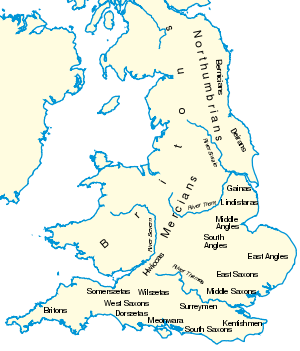Augustine's mission to Christianize King Æthelbert of Kent in 597 was clearly successful, but we cannot discount the fact that he had help. He did not go alone, of course. Also, he had a powerful advocate when he arrived in Kent: Æthelbert's wife, Queen Bertha.
Bertha was a Frankish princess, the daughter of Charibert I of Paris and Ingoberga, and a granddaughter of Clovis I and Clotilde (who became a saint). Part of the marriage arrangement allowed her to bring a bishop with her, Liudhard. Bertha and Liudhard re-established a church from Roman times just outside of Canterbury dedicated to St. Martin of Tours.
By the time of Augustine's arrival, she and Æthelbert had been married about 20 years, and Christianity was not a new concept for the citizens of Kent. A biography of Bertha (unusual for women to have biographies in that era, but her royal status and connection to the Mission made for an exception) claims that, under her influence, Æthelbert actually requested Pope Gregory to send missionaries. No letters of the time support this, but the anecdote told here that precipitated the mission is considered by many to be a spurious argument of the mission created by Bede.
Bertha's ancestry might also have aided the mission in other ways: Frankish royals gave their support to the mission by adding interpreters and priests to Augustine's group as they traveled. The Franks likely also wanted Britain across the Channel (especially Kent, the closest and most powerful Anglo-Saxon kingdom), to be friendlier to the continent. (On the other hand, Gregory might have been hoping for a distant land to be more allied with the papacy than with the Franks.)
Whatever the case, Gregory wrote to Bertha in 601, complimenting her on her faith and her knowledge. The mission surely had a smoother reception than it might have if Bertha and Liudhard had not created an atmosphere amenable to Christianity for years.
Bertha had two children. Eadbald was King of Kent from 616 until 640. Æthelburh was the second wife of King Edwin, who was converted by St. Cuthbert. The date of Bertha's death is not known. She is commemorated in many places in Kent.
Another whose Christian influence on Kent should be noted is the bishop she brought with her, Liudhard. Let's take a look at this neglected man next.








